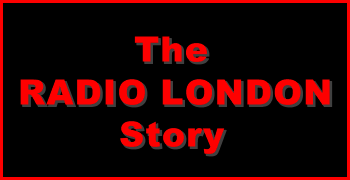Part Six: Peel, Pepper and their final hour
Radio London was a tightly formatted Top 40 station. The only programme which was allowed a bit of flexibility over the music played was the late-night London After Midnight show which tended
to reflect the taste of whoever was hosting it. In 1967 this programme headed off in an unexpected direction.
|
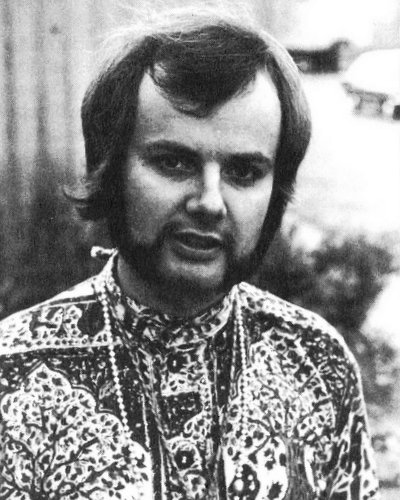
|
|
John Peel, as pictured in ‘Pop Went The Pirates’, published by Lambs' Meadow Publications.
|
A new disc-jockey arrived on Big L in February. Originally from Merseyside, real name John Ravenscroft, he had been working on American radio. As usual for the most junior presenter, he was given two air
shifts, covering for whoever was on leave and taking care of the midnight-2am slot. Broadcasting under his new name of John Peel, he quickly discovered that none of his colleagues - either on
the ship or in the Curzon Street offices - were paying much attention to what he was playing at that time of night. John decided to try an experiment. The format was dispensed with, the Fab 40 stayed in its rack and he unleashed
The Perfumed Garden on an unsuspecting audience. It was the time of hippies, flower power and underground music. In Britain and America bands were experimenting. Jefferson Airplane, Captain Beefheart's Magic Band, Country
Joe & the Fish, the Incredible String Band, Tyrannosaurus Rex and many others had never been heard on British radio before. Peel played them. There is an apocryphal tale that the first the Radio London management knew of
the new programme was when Brian Epstein, the Beatles' manager, telephoned to congratulate them on it. By then The Perfumed Garden had already taken root and begun to flourish. For many listeners throughout Europe,
it was John Peel who turned them on to a whole world of new music (see tribute).
 John Peel in his Perfumed Garden on Radio London, 16th July 1967. Recording from an Offshore Radio Heaven CD (duration 3 minutes 56 seconds)
John Peel in his Perfumed Garden on Radio London, 16th July 1967. Recording from an Offshore Radio Heaven CD (duration 3 minutes 56 seconds)
|
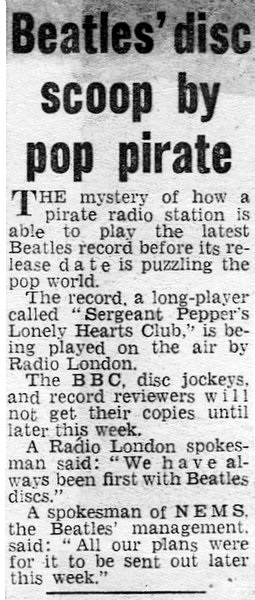
|
|
Cutting from the Daily Mirror, 16th May 1967, courtesy of Merbie.
|
|
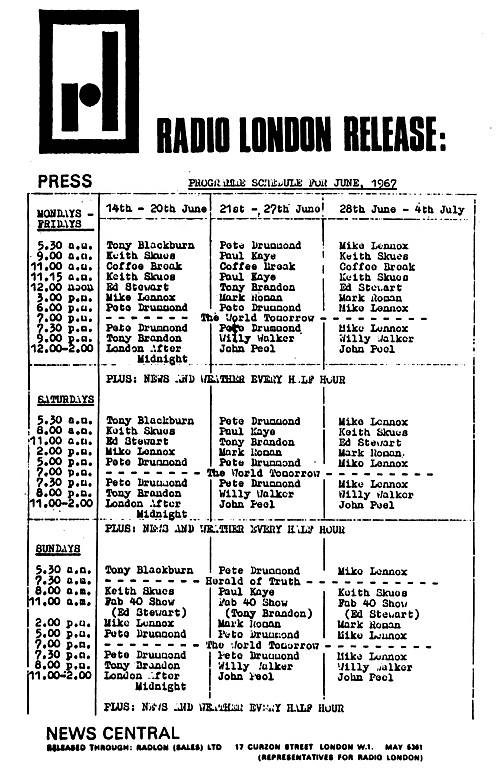
|
|
Radio London's programme schedule for June/July 1967. Scan from ‘Offshore Echo's’.
|
The Beatles were at the forefront of the innovation and experimentation that was taking place in 1967. Millions eagerly awaited their every release. Radio London had already enjoyed the exclusive first
play of Strawberry Fields Forever but, in May, the station achieved something even more impressive: the very first play anywhere of the epoch-defining LP,
Sgt Pepper's Lonely Hearts Club Band. The story of how this came about is recounted on the Radio London website.
 Ed Stewart and John Peel play Sgt Pepper's Lonely Hearts Club Band for the first time on Radio London, 12th May 1967. Audio kindly provided by Hans Knot (duration 2 minutes 29 seconds)
Ed Stewart and John Peel play Sgt Pepper's Lonely Hearts Club Band for the first time on Radio London, 12th May 1967. Audio kindly provided by Hans Knot (duration 2 minutes 29 seconds)
|
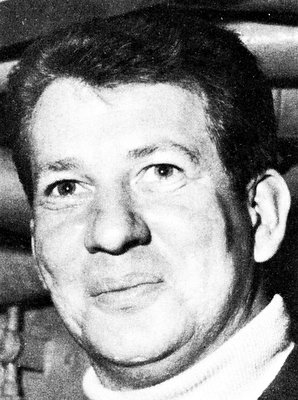
|
|
Radio London's final Breakfast Show presenter, Chuck Blair. Photo from ‘Beatwave’.
|
Throughout 1967 Radio London campaigned vociferously to be allowed to stay on the air but the legislation was looming. Initially Big L insisted that it would continue. Philip Birch investigated various
possibilities including having the ship relay a signal from a foreign country but ultimately none of the options seemed viable. The sales team could not find enough international advertisers to support the station or British
ones prepared to break the law. On 28th July it was announced that Big L would close down at 3pm on 14th August.
 Mike Lennox reports the sad news that Radio London is to close and Pete Drummond discusses the forthcoming demise with the ship's captain. Clip from a
recording issued by CM Leisure Sales from Martin Lynch's collection, kindly provided by Lynne Sims (duration 1 minute 54 seconds)
Mike Lennox reports the sad news that Radio London is to close and Pete Drummond discusses the forthcoming demise with the ship's captain. Clip from a
recording issued by CM Leisure Sales from Martin Lynch's collection, kindly provided by Lynne Sims (duration 1 minute 54 seconds)
 Tommy Vance on Radio London's last ever Fab 40 Show on 6th August 1967 (duration 2 minutes 6 seconds)
Tommy Vance on Radio London's last ever Fab 40 Show on 6th August 1967 (duration 2 minutes 6 seconds)
 Chuck Blair finishes his last Radio London Breakfast Show on 14th August 1967. Recording kindly provided by Albie Somerset (duration 6 minutes 4 seconds)
Chuck Blair finishes his last Radio London Breakfast Show on 14th August 1967. Recording kindly provided by Albie Somerset (duration 6 minutes 4 seconds)
At two o'clock in the afternoon of the 14th August Radio London began its final hour of broadcasting, hosted by Ed Stewart and Paul Kaye. Disc-jockeys and recording stars paid their
respects in a special show pre-recorded the previous evening. In fact the final hour lasted less than sixty minutes - the generator was running slightly faster when the tape was being replayed than it had when it was being recorded.
Despite this infinitesimal increase in speed, the show was a sombre and moving farewell. The last record was played (The Beatles'
A Day in the Life, a Sgt. Pepper album track banned by the BBC), the final advert was aired (for Consulate cigarettes - also
the last advertiser on Caroline South before it went illegal) and then Paul Kaye, the station's first voice, became its last as he closed Radio London down for the final time. The ‘Big Lil’ theme tune played out. At
3pm 266 fell silent, just nine hours ahead of the new act coming into force.
 Radio London's final hour starts with messages from Cliff Richard, Lulu, Mark Roman, Tony Windsor and John Walker of the Walker Brothers (duration 4 minutes
14 seconds)
Radio London's final hour starts with messages from Cliff Richard, Lulu, Mark Roman, Tony Windsor and John Walker of the Walker Brothers (duration 4 minutes
14 seconds)
 Next up it is the Rolling Stones' Mick Jagger, John Peel, Bruce Johnston of the Beach Boys, Duncan Johnson and Cat Stevens (duration 3 minutes 26 seconds)
Next up it is the Rolling Stones' Mick Jagger, John Peel, Bruce Johnston of the Beach Boys, Duncan Johnson and Cat Stevens (duration 3 minutes 26 seconds)
 DJs Kenny Everett, Pete Drummond and Paul Kaye have their say (duration 3 minutes 59 seconds)
DJs Kenny Everett, Pete Drummond and Paul Kaye have their say (duration 3 minutes 59 seconds)
 Tony Blackburn says goodbye and Paul Kaye reads the last news bulletin (duration 2 minutes 16 seconds)
Tony Blackburn says goodbye and Paul Kaye reads the last news bulletin (duration 2 minutes 16 seconds)
 Madeline Bell, Chuck Blair, Chris Denning, Dave Cash and Jonathan King join the party (duration 4 minutes 5 seconds)
Madeline Bell, Chuck Blair, Chris Denning, Dave Cash and Jonathan King join the party (duration 4 minutes 5 seconds)
 Farewells from Keith Skues, Tommy Vance, Dusty Springfield and Ed Stewart (duration 5 minutes 17 seconds)
Farewells from Keith Skues, Tommy Vance, Dusty Springfield and Ed Stewart (duration 5 minutes 17 seconds)
 Finally there's just time for Ringo Starr and Managing Director Philip Birch before Paul Kaye closes the station for the last time (duration 5 minutes 47 seconds)
Finally there's just time for Ringo Starr and Managing Director Philip Birch before Paul Kaye closes the station for the last time (duration 5 minutes 47 seconds)

Just down the dial, on 259 metres, the Caroline South DJs welcomed their new listeners and held a minute's silence in memory of the departed rival. An emotional Robbie Dale
promised that Caroline would keep going and paid his respects to his Radio London colleagues.
At 6.40 that evening the returning disc-jockeys arrived at Liverpool Street station in London. Thousands of fans had gathered there and earlier had seen off the last team of Caroline broadcasters to leave the country. They
welcomed the Big L presenters defiantly. The terminus was brought to a complete standstill as the fans swarmed everywhere, waving banners and shouting support for the offshore stations (see cutting).
But it was all too late; the Marine Offences Act was about to become law. It was a final act of protest by thousands of unhappy listeners who, after two and three quarter years, were going to have to get used to life without
wonderful Radio London.
The BBC's Radio One was launched at the end of the following month. Its jingles were made by PAMS of Dallas and based on the same package used by Radio London. The first disc-jockey team included eleven former Big L presenters
(Ed Stewart, Keith Skues, Duncan Johnson, Pete Drummond, Kenny Everett, Tony Blackburn, Pete Brady, John Peel, Chris Denning, Dave Cash and Mike Lennox)
with others joining later. BBC producer Johnny Beerling had even made a secret trip out to the Galaxy before the closedown to see how it should be done. Radio London might have been a pirate but it seemed there were still a few
things it could teach ‘Auntie’ BBC. It was an unstated admission that Radio London had been something very special.
|
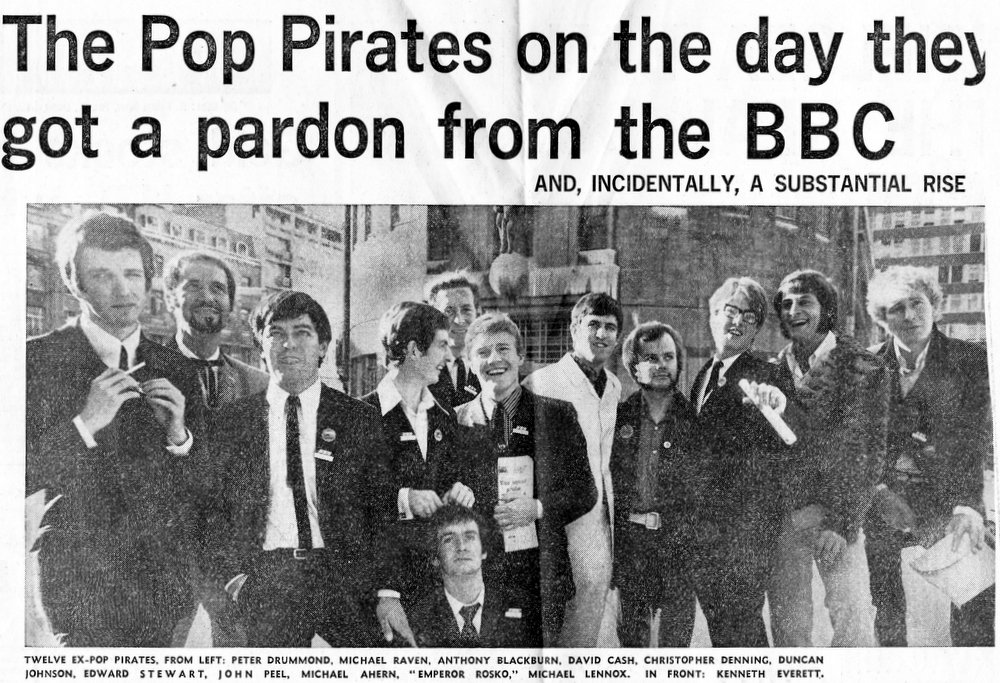
|
|
Some of the DJs line up for Radio One, including Pete Drummond, Tony Blackburn, Dave Cash, Kenny Everett, Chris Denning, Duncan Johnson, Ed Stewart, John Peel and Mike Lennox from Big L. Cutting from ‘The
Sun’ kindly provided by Mike Lewis.
|
With grateful thanks to ‘The London Sound’ by Brian Long and ‘The Wonderful Radio London
Story’ by Chris Elliot.
For loads more information about Big L, see the Radio London website.
|

